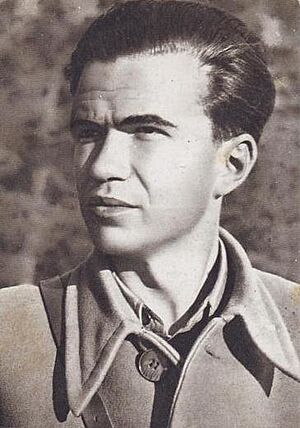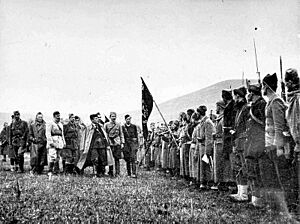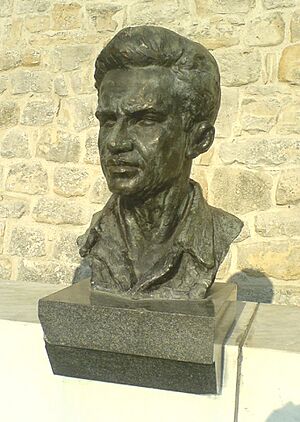Ivo Lola Ribar facts for kids
Quick facts for kids
Ivo Lola Ribar
|
|
|---|---|
 |
|
| Birth name | Ivan Ribar |
| Nickname(s) | Ivo Lola |
| Born | 23 April 1916 Zagreb, Croatia-Slavonia, Austro-Hungary |
| Died | 27 November 1943 (aged 27) Glamočko field near Glamoč, Independent State of Croatia |
| Buried | (44°49′19″N 20°26′56″E / 44.82194°N 20.44891°E) |
| Allegiance | Yugoslav partisans |
| Years of service | 1941–1943 |
| Awards | People's Hero of Yugoslavia |
| Relations | Ivan Ribar (father), Jurica Ribar (brother) |
Ivan Ribar (born April 23, 1916 – died November 27, 1943), known as Ivo Lola, was a brave young leader from Yugoslavia. He was a key figure in the fight against fascism during World War II. Lola Ribar was a Croatian by birth.
He worked closely with Josip Broz Tito, who led the Yugoslav Communist Party. In 1936, Ribar became a top leader of the Young Communist League of Yugoslavia (SKOJ). During World War II in Yugoslavia, he was a main leader of the Yugoslav Partisans. The Partisans were a group fighting against the invaders. He also helped create and run youth magazines. In 1942, Ribar helped start the Unified League of Anti-Fascist Youth of Yugoslavia (USAOJ). He died in 1943 near Glamoč when a German bomb hit his location. He was about to fly to Cairo to represent Yugoslavia. In 1944, Ribar was given the title of People's Hero of Yugoslavia. Lola was the older son of Ivan Ribar, who later became the first President of Yugoslavia. His brother, Jurica Ribar, was also a People's Hero.
Early Life and Education
Ivo Lola Ribar was born in Zagreb. He spent most of his life in Belgrade. He studied law at the University of Belgrade. During his time at university, he joined the Communist Party of Yugoslavia. From 1936, he led the Young Communist League of Yugoslavia (SKOJ). As a student, he traveled across Europe. He attended meetings in Brussels (1935), Geneva (1936), and Paris (1937).
Joining the Resistance
In 1940, the government of the Kingdom of Yugoslavia put him in Bihać Prison. This was because he was a member of the Communist Party. When Second World War in Yugoslavia began, he was a member of the Party's main committee. He quickly joined the Supreme Command of the Partisans. There, he worked with Josip Broz Tito and Edvard Kardelj. They planned how to resist the invaders.
In October 1943, Lola Ribar was chosen for an important mission. He was to lead the first Partisan military group to the Middle East Command. However, just before he could board a captured German plane to Cairo, he was killed. This happened during a German bombing of the Glamoč airfield. This airfield was in south-western Bosnia. Two British officers, William Deakin and Fitzroy Maclean, wrote about his death. Maclean said Lola Ribar was an amazing young leader. He believed Ribar was "destined to play a great part in building the new Yugoslavia."
His Family's Story
Lola Ribar's father, Ivan Ribar, held important jobs. He worked in the government both before and after World War II. His whole family was involved in the resistance movement. His younger brother, Jurica Ribar, also died in October 1943. This happened near Kolašin. His mother, Tonica, was killed in July 1944. This occurred in the village of Kupinovo.
His fiancée, Sloboda Trajković, was also part of the revolutionary movement. She was captured and died in the Banjica concentration camp. Her entire family died there too. She refused to write a letter that would help the enemy find Lola.
Remembering Lola Ribar
After his death, Ribar was first secretly buried. This was in the village of Gornji Ribnik near Ključ. This happened on November 30, 1943. His body was later moved in 1948. He was reburied at the Tomb of People's Heroes. This tomb is located at the Belgrade Fortress. He was officially named a People's Hero of Yugoslavia on November 18, 1944.
Ivo Lola Ribar became a very important figure after World War II. Many streets, schools, and factories were named after him. A company in Karlovac that makes medical supplies is named after him. A brand of scooters was also named after him. The Ivo Lola Ribar Institute in Belgrade carries his name. A street in Zagreb was named after him until 1991. Now, several streets in Croatian cities like Rijeka, Valpovo, Novi Banovci, and since 2009, Zagreb, are named in his honor.
The rock band Korni Grupa released a song called "Ivo Lola" in 1973. This song tells the story of the last letter Lola Ribar sent to his fiancée, Sloboda Trajković. A high school in Pristina was named after him after World War II. Today, it is known as Sami Frashëri High School.



